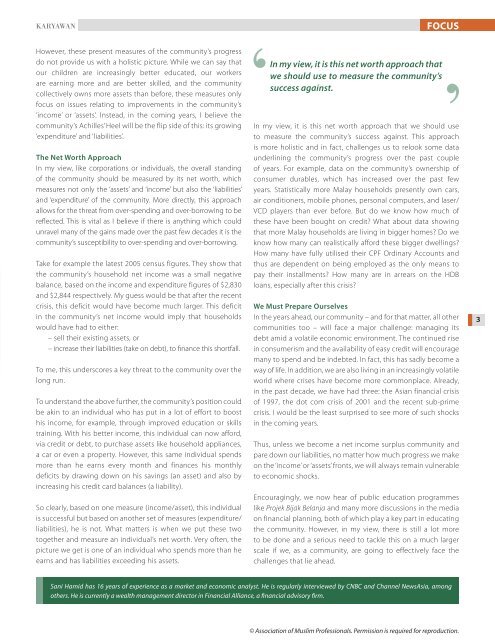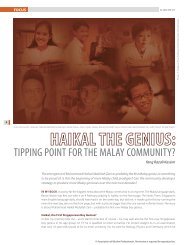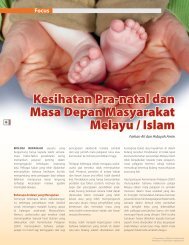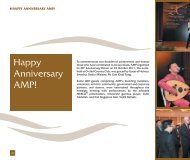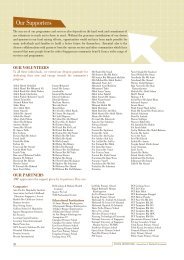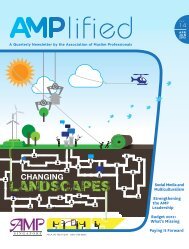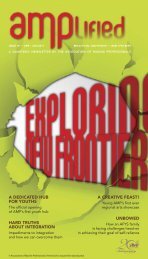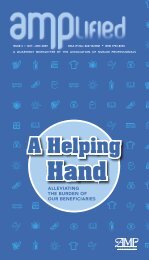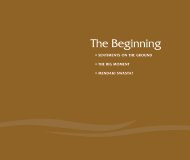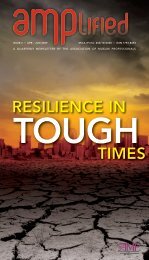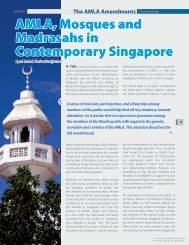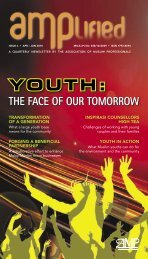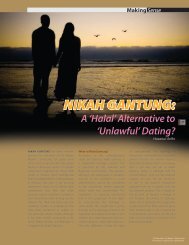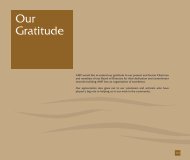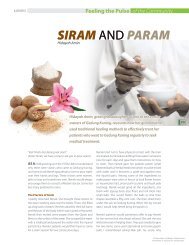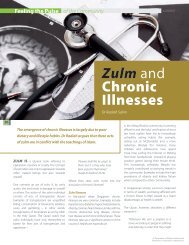community - Association of Muslim Professionals
community - Association of Muslim Professionals
community - Association of Muslim Professionals
You also want an ePaper? Increase the reach of your titles
YUMPU automatically turns print PDFs into web optimized ePapers that Google loves.
KARYAWAN<br />
FOCUS<br />
However, these present measures <strong>of</strong> the <strong>community</strong>’s progress<br />
do not provide us with a holistic picture. While we can say that<br />
our children are increasingly better educated, our workers<br />
are earning more and are better skilled, and the <strong>community</strong><br />
collectively owns more assets than before, these measures only<br />
focus on issues relating to improvements in the <strong>community</strong>’s<br />
‘income’ or ‘assets’. Instead, in the coming years, I believe the<br />
<strong>community</strong>’s Achilles’ Heel will be the flip side <strong>of</strong> this: its growing<br />
‘expenditure’ and ‘liabilities’.<br />
The Net Worth Approach<br />
In my view, like corporations or individuals, the overall standing<br />
<strong>of</strong> the <strong>community</strong> should be measured by its net worth, which<br />
measures not only the ‘assets’ and ‘income’ but also the ‘liabilities’<br />
and ‘expenditure’ <strong>of</strong> the <strong>community</strong>. More directly, this approach<br />
allows for the threat from over-spending and over-borrowing to be<br />
reflected. This is vital as I believe if there is anything which could<br />
unravel many <strong>of</strong> the gains made over the past few decades it is the<br />
<strong>community</strong>’s susceptibility to over-spending and over-borrowing.<br />
Take for example the latest 2005 census figures. They show that<br />
the <strong>community</strong>’s household net income was a small negative<br />
balance, based on the income and expenditure figures <strong>of</strong> $2,830<br />
and $2,844 respectively. My guess would be that after the recent<br />
crisis, this deficit would have become much larger. This deficit<br />
in the <strong>community</strong>’s net income would imply that households<br />
would have had to either:<br />
– sell their existing assets, or<br />
– increase their liabilities (take on debt), to finance this shortfall.<br />
To me, this underscores a key threat to the <strong>community</strong> over the<br />
long run.<br />
To understand the above further, the <strong>community</strong>’s position could<br />
be akin to an individual who has put in a lot <strong>of</strong> effort to boost<br />
his income, for example, through improved education or skills<br />
training. With his better income, this individual can now afford,<br />
via credit or debt, to purchase assets like household appliances,<br />
a car or even a property. However, this same individual spends<br />
more than he earns every month and finances his monthly<br />
deficits by drawing down on his savings (an asset) and also by<br />
increasing his credit card balances (a liability).<br />
So clearly, based on one measure (income/asset), this individual<br />
is successful but based on another set <strong>of</strong> measures (expenditure/<br />
liabilities), he is not. What matters is when we put these two<br />
together and measure an individual’s net worth. Very <strong>of</strong>ten, the<br />
picture we get is one <strong>of</strong> an individual who spends more than he<br />
earns and has liabilities exceeding his assets.<br />
In my view, it is this net worth approach that<br />
we should use to measure the <strong>community</strong>’s<br />
success against.<br />
In my view, it is this net worth approach that we should use<br />
to measure the <strong>community</strong>’s success against. This approach<br />
is more holistic and in fact, challenges us to relook some data<br />
underlining the <strong>community</strong>’s progress over the past couple<br />
<strong>of</strong> years. For example, data on the <strong>community</strong>’s ownership <strong>of</strong><br />
consumer durables, which has increased over the past few<br />
years. Statistically more Malay households presently own cars,<br />
air conditioners, mobile phones, personal computers, and laser/<br />
VCD players than ever before. But do we know how much <strong>of</strong><br />
these have been bought on credit? What about data showing<br />
that more Malay households are living in bigger homes? Do we<br />
know how many can realistically afford these bigger dwellings?<br />
How many have fully utilised their CPF Ordinary Accounts and<br />
thus are dependent on being employed as the only means to<br />
pay their installments? How many are in arrears on the HDB<br />
loans, especially after this crisis?<br />
We Must Prepare Ourselves<br />
In the years ahead, our <strong>community</strong> – and for that matter, all other<br />
communities too – will face a major challenge: managing its<br />
debt amid a volatile economic environment. The continued rise<br />
in consumerism and the availability <strong>of</strong> easy credit will encourage<br />
many to spend and be indebted. In fact, this has sadly become a<br />
way <strong>of</strong> life. In addition, we are also living in an increasingly volatile<br />
world where crises have become more commonplace. Already,<br />
in the past decade, we have had three: the Asian financial crisis<br />
<strong>of</strong> 1997, the dot com crisis <strong>of</strong> 2001 and the recent sub-prime<br />
crisis. I would be the least surprised to see more <strong>of</strong> such shocks<br />
in the coming years.<br />
Thus, unless we become a net income surplus <strong>community</strong> and<br />
pare down our liabilities, no matter how much progress we make<br />
on the ‘income’ or ‘assets’ fronts, we will always remain vulnerable<br />
to economic shocks.<br />
Encouragingly, we now hear <strong>of</strong> public education programmes<br />
like Projek Bijak Belanja and many more discussions in the media<br />
on financial planning, both <strong>of</strong> which play a key part in educating<br />
the <strong>community</strong>. However, in my view, there is still a lot more<br />
to be done and a serious need to tackle this on a much larger<br />
scale if we, as a <strong>community</strong>, are going to effectively face the<br />
challenges that lie ahead.<br />
3<br />
Sani Hamid has 16 years <strong>of</strong> experience as a market and economic analyst. He is regularly interviewed by CNBC and Channel NewsAsia, among<br />
others. He is currently a wealth management director in Financial Alliance, a financial advisory firm.<br />
© <strong>Association</strong> <strong>of</strong> <strong>Muslim</strong> Pr<strong>of</strong>essionals. Permission is required for reproduction.


